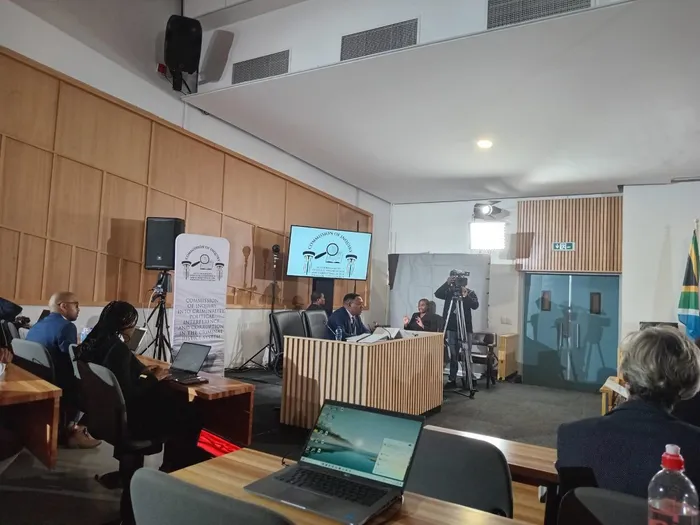National police boss Fannie Masemola says Senzo Mchunu 'overstepped the mark'

National Police Commissioner Fannie Masemola testified before the commission, addressing allegations of political interference in the criminal justice system.
Image: Rapula Moatshe/Independent Newspapers
The Madlanga Judicial Commission of Inquiry on Monday resumed its investigation into allegations of political interference in the criminal justice system at the Brigitte Mabandla Justice College in Pretoria.
The venue has at least 300 seats allocated for public members, however, on Monday morning the auditorium room had not more than nine attendees in the public space.
Tthe dwindling attendance at the commission's proceedings may indicate that public interest is waning now that KwaZulu-Natal police Lieutenant General Nhlanhla Mkhwanazi has completed his testimony.
Mkhwanazi's explosive allegations of politicians and businesspeople interfering with the criminal justice system sparked intense debate during his three-day appearance at the inquiry last week.
On Monday, National Police Commissioner Fannie Masemola took the stand to testify on the allegations of political interference in the criminal justice system.
As he began his testimony, Justice Mbuyiseli Madlanga reminded him to speak up, as Advocate Sandile Khumalo SC, one of the commission's lead counsels, had requested.
During his testimony, Masemola repeatedly mentioned Lieutenant General Khumalo without specifying the first name, prompting the commissioners to request clarification.
Evidence leader Advocate Terry Motau SC clarified that they were not referring to co-commissioner Sandile Khumalo present at the hearing.
Masemola responded lightheartedly, confirming he was talking about a different Lieutenant General Dumisani Khumalo, who was the head of crime intelligence at the time, holding the rank of brigadier.
He jokingly mentioned there would be many Khumalos involved, but their work would not be related, adding: "Those that I know do a good job. I don’t know [about] the co-commissioner." The auditorium erupted in laughter, with co-commissioner Khumalo joining in.
Dumisani Khumalo, the head of Crime Intelligence, was arrested in June by the Investigative Directorate Against Corruption.
He faces allegations of misusing crime intelligence funds and is currently battling to have his bail conditions relaxed.
Masemola faced tough questioning from Justice Madlanga regarding his stance on instructions from the Minister of Police that may overstep into operational matters under the national commissioner's purview.
Masemola expressed a view that if the instruction is lawful, he would comply with it, but would defy it if it is unlawful.
He clarified the roles of the Minister of Police and the national SAPS commissioner, saying that the minister's primary responsibility is setting national policing policy and strategic direction.
However, the operational aspects, including resource allocation, fall under the national commissioner's purview.
“For instance in this case of a Political Killings Task Team that is working at a lower level under a provincial commissioner. If he (minister) ever found anything wrong with the task team he could say that task team ‘I think you need to disband it’. And, we can engage in terms of the why and how and so on.
"But to go further to say disband but then after saying disband he go further to say now, now, now. Not even tomorrow. I think that is a total encroachment in terms of the mandate of national commissioner in terms of performing my duty,” Masemola said.
He provided background information on the Political Killings Task Team, established in 2018 to address high-profile assassinations targeting politicians, councillors, and whistleblowers in KwaZulu-Natal.
The task team's mandate was later expanded to other provinces, including the Eastern Cape and Gauteng, and included investigating the killings of traditional leaders.
In a letter dated December 31, the suspended Police Minister Senzo Mchunu directed Masemola to disband the team, citing it had fulfilled its mandate.
Masemola’s testimony is still under way.
rapula.moatshe@inl.co.za